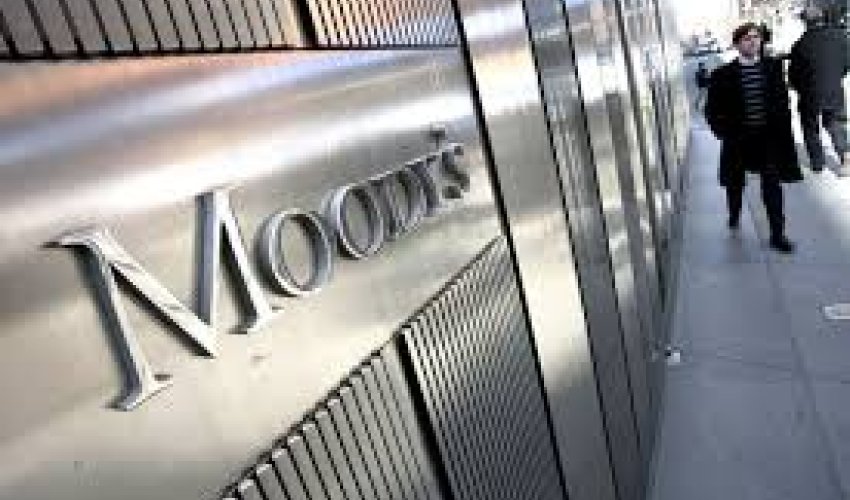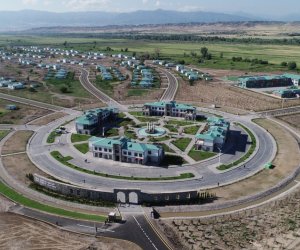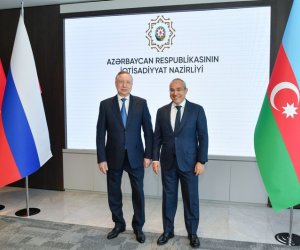Moody's lowers Azerbaijan GDP growth forecast

Moody's Investors Service has lowered Azerbaijan's 2015 GDP growth forecast to 1% from 4.3%. The rating agency also increased the country's inflation rate forecast to 9% from 3.9%.
Moody's said in a statement: "Real GDP growth decelerated considerably to 2.8% in 2014 (from 5.8% in 2013), according to the State Statistical Committee of the Republic of Azerbaijan. While non-oil GDP expanded by 7% (down from 10% in 2013), oil GDP declined by 2.9% (after an increase of +1% in 2013). As a result of progressing diversification, the share of non-oil GDP in total GDP climbed further to around 56% (from 52.5% in 2013). Because of the country's still large reliance on the hydrocarbon sector, the Azeri economy has been adversely affected by the steep decline in global oil prices, which more than halved between June 2014 and March 2015, from around 108 $/bbl to roughly 53 $/bbl (according to the crude oil average spot price of Brent, Dubai and WTI). In addition to falling oil prices, domestic oil production has retreated as well. Total domestic oil extraction fell by more than 11% between July 2014 and February 2015, according to latest data from SOCAR.
"Notwithstanding the pronounced drop in oil prices in the second half of last year, the authorities stressed its commitment to exchange-rate stability in January 2015. However, on 16 February 2015, the Central Bank of Azerbaijan (CBA) abandoned its hard peg of the manat to the $. Under its new operational exchange-rate policy framework for its exchange rate policy, the CBA will target a currency basket comprising the EUR and $. Moreover, the CBA devalued the manat currency by around 25% (to manat/$ 1.05 from manat/$ 0.78) in a surprise move on 21 February 2015. The CBA stated that it devalued the manat in an attempt to launch additional stimuli to diversify the national economy, further boost its international competitiveness and export potential, and ensure strategic sustainability of the balance of payments and the country's international creditability. Furthermore, it said that it corrected the exchange rate of manat to neutralize the negative impact of recent considerable depreciation of national currencies of Azerbaijan's major trade partners on the competitive advantage of the national economy.
"In our opinion, the devaluation has various implications on the Azeri economy. On the one hand, the drastic devaluation of the manat will ease imminent pressures of lower oil prices on public finances and SOFAZ' foreign asset position, the CBA's foreign exchange reserves and the county's balance of payments as well as will make Azerbaijan's non-oil export products more competitive, which we view as credit positive. On the other hand, the drastic devaluation will likely lead to a spike in consumer price inflation, which we expect to average at around 9% in 2015 (up from 1.5% in 2014), thereby impairing private households' purchasing power and hence adversely affect private consumption and overall real economic growth, which we view as credit negative.
"According to preliminary data from the State Statistical Committee of the Republic of Azerbaijan, real GDP grew by 4.2% yoy in January-February 2015, while real non-oil GDP expanded at 5.1% yoy. This strong growth in the first two months notwithstanding, we forecast real GDP to grow only by 1% this year as lower oil prices and exchange rate devaluation will eventually adversely affect the Azeri economy in our view. Non-oil GDP sectors will remain the backbone of real economic growth in 2015, while oil GDP is expected to shrink further by around 3%. Going forward, we forecast real GDP growth to accelerate only moderately to 1.7% in 2016 amid recovering oil prices (which we project rise to around 65 $/bbl from roughly 55 $/bbl in 2014).
"The 2014 state budget of the Republic of Azerbaijan recorded a deficit of manat 299 million or around 0.5% of GDP. While state budget revenue amounted to manat 18.4 billion (or 31.2% of GDP) in 2014, state budget expenditures totalled manat 18.7 billion (or 31.7% of GDP). As in previous years, transfers from SOFAZ accounted for a significant share of state budget revenue, although the share of SOFAZ transfers decreased to 50.7% of state budget revenue in 2014 from 58.2% in 2013. The 2015 state budget, which is based on an oil price assumption of 90 $/bbl, was signed by the President in November 2014 and hence before the accelerated decline in oil prices in December/January as well as before the CBA's devaluation of the manat currency in February 2015. It anticipates expenditure of manat 21.1 billion (equivalent to around 39.2% of GDP forecast by us for this year), revenue of manat 19.4 billion (or 36.1% of GDP) and hence foresees a deficit of manat 1.7 billion (or 3.1% of GDP). 53.4% of state budget revenue will come from SOFAZ through transfers.
"In January 2015, SOFAZ's 2015 budget was approved. SOFAZ's 2015 budget, which is also based on an oil price assumption of 90 $/bbl, foresees an operating deficit of manat 1.6 billion (or 2.9% of GDP forecast by us for 2015). In light of our oil price assumption of around 55 $/bbl (compared to 90 $/bbl in the budget) and devaluation in February (which moderated the drop in the oil price measured in local currency terms)-- and considering that more than 95% of SOFAZ' revenue directly depends on global oil price developments and 87.9% of SOFAZ' 2015 expenditure are tied to transfers to the state budget -- we see a significant risk that SOFAZ' operating deficit may turn out much wider in 2015 than budgeted.
"As a result of lower oil prices and devaluation, we caution that the consolidated government's fiscal balance could post a deficit of almost 10% of GDP in 2015. However, at the same time we stress that the government has ample financial resources (i.e. its foreign assets held at the CBA and SOFAZ) to mitigate the adverse effects from lower oil prices on the Azeri economy."
www.ann.az
Latest news 
More news 



































 Photo
Photo 



 Video
Video 

